Weshy
On this page, you find all documents, package deals, and flashcards offered by seller weshy.
- 51
- 0
- 0
Community
- Followers
- Following
51 items
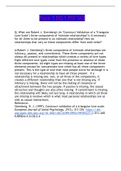
Topic 5 DQ 1 PSY 362 GRADED A
Topic 5 DQ 1 PSY 362 Q: What are Robert J. Sternberg's (in "Construct Validation of a Triangular Love Scale") three components of intimate relationships? Is it necessary for all three to be present in an intimate relationship? How do relationships that vary on these components differ from each other? A: Robert J. Sternberg’s three components of intimate relationships are intimacy, passion, and commitment. These three components are not always all present in relationships which crea...
- Exam (elaborations)
- • 1 pages •
Topic 5 DQ 1 PSY 362 Q: What are Robert J. Sternberg's (in "Construct Validation of a Triangular Love Scale") three components of intimate relationships? Is it necessary for all three to be present in an intimate relationship? How do relationships that vary on these components differ from each other? A: Robert J. Sternberg’s three components of intimate relationships are intimacy, passion, and commitment. These three components are not always all present in relationships which crea...
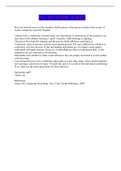
Psy 362 TOPIC 4 DQ2:
Psy 362 TOPIC 4 DQ2: How are both the power of the situation and the power of the person evident in the results of Asch's conformity research? Explain. I found Asch’s conformity research study very fascinating. It reminds me of the scenarios you hear about with children forming a “pack” mentality while bullying or fighting. The power from both the situation and the person which influence conformity is: Conformity tends to increase with the more people present. The more difficult ...
- Exam (elaborations)
- • 1 pages •
Psy 362 TOPIC 4 DQ2: How are both the power of the situation and the power of the person evident in the results of Asch's conformity research? Explain. I found Asch’s conformity research study very fascinating. It reminds me of the scenarios you hear about with children forming a “pack” mentality while bullying or fighting. The power from both the situation and the person which influence conformity is: Conformity tends to increase with the more people present. The more difficult ...
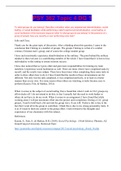
PSY 362 Topic 4 DQ 1
PSY 362 Topic 4 DQ 1 To what groups do you belong? Describe a situation when you experienced deindividuation, social loafing, or social facilitation while performing a task?experienced deindividuation, social loafing, or social facilitation of the dominant response while To what groups do you belong? In the presence of a group of people, have you recently or ever performing some task? Julie and Class, Thank you for the great topic of discussion. After a thinking about this question, I came ...
- Exam (elaborations)
- • 1 pages •
PSY 362 Topic 4 DQ 1 To what groups do you belong? Describe a situation when you experienced deindividuation, social loafing, or social facilitation while performing a task?experienced deindividuation, social loafing, or social facilitation of the dominant response while To what groups do you belong? In the presence of a group of people, have you recently or ever performing some task? Julie and Class, Thank you for the great topic of discussion. After a thinking about this question, I came ...
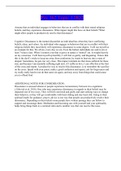
Psy 362 Topic 3 DQ2
Assume that an individual engages in behaviors that are in conflict with their stated religious beliefs, and they experience dissonance. What impact might this have on their beliefs? What might allow people to productively resolve that dissonance? Cognitive Dissonance is the mental discomfort an individual has when they have conflicting beliefs, ideas, and values. An individual who engages in behaviors that are in conflict with their religious beliefs they most likely will experience disson...
- Exam (elaborations)
- • 1 pages •
Assume that an individual engages in behaviors that are in conflict with their stated religious beliefs, and they experience dissonance. What impact might this have on their beliefs? What might allow people to productively resolve that dissonance? Cognitive Dissonance is the mental discomfort an individual has when they have conflicting beliefs, ideas, and values. An individual who engages in behaviors that are in conflict with their religious beliefs they most likely will experience disson...
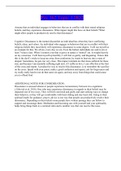
Psy 362 Topic 3 DQ2
Assume that an individual engages in behaviors that are in conflict with their stated religious beliefs, and they experience dissonance. What impact might this have on their beliefs? What might allow people to productively resolve that dissonance? Cognitive Dissonance is the mental discomfort an individual has when they have conflicting beliefs, ideas, and values. An individual who engages in behaviors that are in conflict with their religious beliefs they most likely will experience disson...
- Exam (elaborations)
- • 1 pages •
Assume that an individual engages in behaviors that are in conflict with their stated religious beliefs, and they experience dissonance. What impact might this have on their beliefs? What might allow people to productively resolve that dissonance? Cognitive Dissonance is the mental discomfort an individual has when they have conflicting beliefs, ideas, and values. An individual who engages in behaviors that are in conflict with their religious beliefs they most likely will experience disson...

PSY 362 Topic 3 DQ 1
PSY 362 Topic 3 DQ 1 Research on the relation between religion and prejudice is well summarized by Gordon Allport: "The role of religion is paradoxical. It makes prejudice and it unmakes prejudice." In your opinion, do you agree, and, if so, why might this be true? If you do not agree, explain your reasoning. According to the text, prejudice causes religion by leading people to create religious ideas to support their prejudices. Certain churches tell you that you need to be dedicate...
- Exam (elaborations)
- • 1 pages •
PSY 362 Topic 3 DQ 1 Research on the relation between religion and prejudice is well summarized by Gordon Allport: "The role of religion is paradoxical. It makes prejudice and it unmakes prejudice." In your opinion, do you agree, and, if so, why might this be true? If you do not agree, explain your reasoning. According to the text, prejudice causes religion by leading people to create religious ideas to support their prejudices. Certain churches tell you that you need to be dedicate...
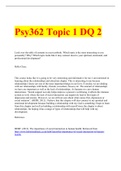
Psy362 Topic 1 DQ 2
Psy362 Topic 1 DQ 2 Look over the table of contents in your textbook. Which topic is the most interesting to you personally? Why? Which topic looks like it may connect most to your spiritual, emotional, and professional development? Hello Class, This course looks like it is going to be very interesting and informative for me. I am interested in learning about the relationships and attraction chapter. This is interesting to me because relationships I know are one of the most important...
- Exam (elaborations)
- • 1 pages •
Psy362 Topic 1 DQ 2 Look over the table of contents in your textbook. Which topic is the most interesting to you personally? Why? Which topic looks like it may connect most to your spiritual, emotional, and professional development? Hello Class, This course looks like it is going to be very interesting and informative for me. I am interested in learning about the relationships and attraction chapter. This is interesting to me because relationships I know are one of the most important...
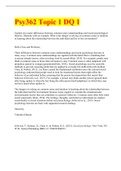
Psy362 Topic 1 DQ 1 GRADED A
Psy362 Topic 1 DQ 1 Explain two major differences between common sense understandings and social psychological theories. Illustrate with an example. What is the danger in relying on common sense or intuition in learning about the relationship between the individual and his or her environment? Hello Class and Professor, There differences between common-sense understandings and social psychology theories in many ways. Common sense understandings are applied with the belief that is somethi...
- Exam (elaborations)
- • 1 pages •
Psy362 Topic 1 DQ 1 Explain two major differences between common sense understandings and social psychological theories. Illustrate with an example. What is the danger in relying on common sense or intuition in learning about the relationship between the individual and his or her environment? Hello Class and Professor, There differences between common-sense understandings and social psychology theories in many ways. Common sense understandings are applied with the belief that is somethi...
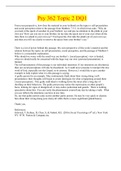
Psy 362 Topic 2 DQ1 LATEST
Psy 362 Topic 2 DQ1 From your perspective, how does the material in your textbook on the topics o self-presentation and social perception relate to the passage from Matthew 7:3-5, in which Jesus asks: “Why do you look at the speck of sawdust in your brothers’ eye and pay no attention to the plank in your own eye? How can you say to your brother, let me take the speck out of your eyes when all the time there is a plank in your own eye? You hypocrite, first take the plank out of your own ey...
- Exam (elaborations)
- • 1 pages •
Psy 362 Topic 2 DQ1 From your perspective, how does the material in your textbook on the topics o self-presentation and social perception relate to the passage from Matthew 7:3-5, in which Jesus asks: “Why do you look at the speck of sawdust in your brothers’ eye and pay no attention to the plank in your own eye? How can you say to your brother, let me take the speck out of your eyes when all the time there is a plank in your own eye? You hypocrite, first take the plank out of your own ey...
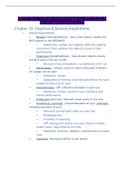
PEDS: Quiz 2 Study Guide Chapters: ATI 15-19 & 42-44; Book 19-20 & 28I
PEDS: Quiz 2 Study Guide Chapters: ATI 15-19 & 42-44; Book 19-20 & 28I Chapter 15- Cognitive & Sensory Impairments • Visual impairments • Myopia (nearsightedness) - Sees close objects clearly but NOT objects in the DISTANCE • Headaches, vertigo, eye rubbing, difficulty reading, clumsiness (freq. walking into objects) & poor school performance • Hyperopia (farsightedness) - Sees distant objects clearly but NOT object that are CLOSE • Because of accommodation, not detected until ...
- Exam (elaborations)
- • 12 pages •
PEDS: Quiz 2 Study Guide Chapters: ATI 15-19 & 42-44; Book 19-20 & 28I Chapter 15- Cognitive & Sensory Impairments • Visual impairments • Myopia (nearsightedness) - Sees close objects clearly but NOT objects in the DISTANCE • Headaches, vertigo, eye rubbing, difficulty reading, clumsiness (freq. walking into objects) & poor school performance • Hyperopia (farsightedness) - Sees distant objects clearly but NOT object that are CLOSE • Because of accommodation, not detected until ...
